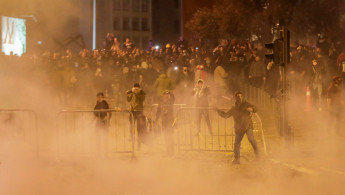Scores of Lebanese protesters injured in hail of tear gas, rubber bullets
The confrontations were among the most violent in the nearly two months of protests that have engulfed Lebanon, and witnessed the first use of rubber bullets against protesters by the security forces.
Authorities also tackled demonstrators with tear gas and water cannons, injuring more than 130 people, including some beaten repeatedly with batons by security forces.
In the capital, nearly a dozen riot police stood over two protesters and beat them with batons early on Sunday, according to an Associated Press reporter.
On Sunday, attackers allegedly set fire to the officers of two major political parties in the country's north, the state-run National News Agency reported.
Unidentified assailants broke the windows and torched the local office for caretaker Prime Minister Saad al-Hariri's political party in the town of Kharibet al-Jindin the northern Akkar district, accordingt to the news agency.
|
|
The reports by the state-run agency follow accusations in Lebanese media over the weekend that unidentified "infiltrators" had stoked violence with security forces in Beirut.
Activists have meanwhile accused plainclothes police of instigating the violence.
Saturday's clashes erupted at the entrance to the street leading to parliament, which was blocked by security forces.
Images broadcast by local TV channel LBC showed the anti-government protesters trying to break through metal police barricades, and officers firing tear gas and beating them.
The demonstrators overturned heavy flower pots and shouted slogans against the security forces and parliament speaker Nabih Berri, the footage showed.
Clashes followed in Martyrs Square - the epicentre of protests since October - and on a bridge in the city centre, which was brought to a standstill for over eight hours as authorities fired a stream of tear gas canisters at the hundreds of protesters, who set fires in trash cans on the main streets, in part to mitigate the effects of tear gas.
Footage broadcast on local television also pictured demonstrators throwing stones at security forces, something that has not been seen since the protest began on October 17. One officer was injured in the eye when a protester hit him with a stone, according to an AP reporter.Interior Minister Raya al-Hassan also blamed the clashes on infiltrators and called on demonstrators to be wary of those who want to exploit their protests for political reasons. She didn't elaborate.
Hassan on Sunday ordered an investigation into the confrontrations.
The clashes come just a day ahead of scheduled talks to name a new prime minister.
President Aoun is expected to meet with different parliamentary blocs to name a contender on Monday, with previous negotiations having broken down.
Hariri, who resigned two weeks after the protests broke out, has emerged as the likely candidate for the job after weeks of back and forth.
But demonstrators have called for the complete overhaul of the country's entrenched political class, which is accused of three decades of economic mismanagement and corruption.
The caretaker prime minister is a part of that political elite, and protesters insist they want a technocratic government, not one aligned with established political parties.
Follow us on Twitter and Instagram to stay connected





 Follow the Middle East's top stories in English at The New Arab on Google News
Follow the Middle East's top stories in English at The New Arab on Google News
![Israeli forces ordered bombed Gaza's Jabalia, ordering residents to leave [Getty]](/sites/default/files/styles/image_330x185/public/2176418030.jpeg?h=a5f2f23a&itok=_YGZaP1z)

